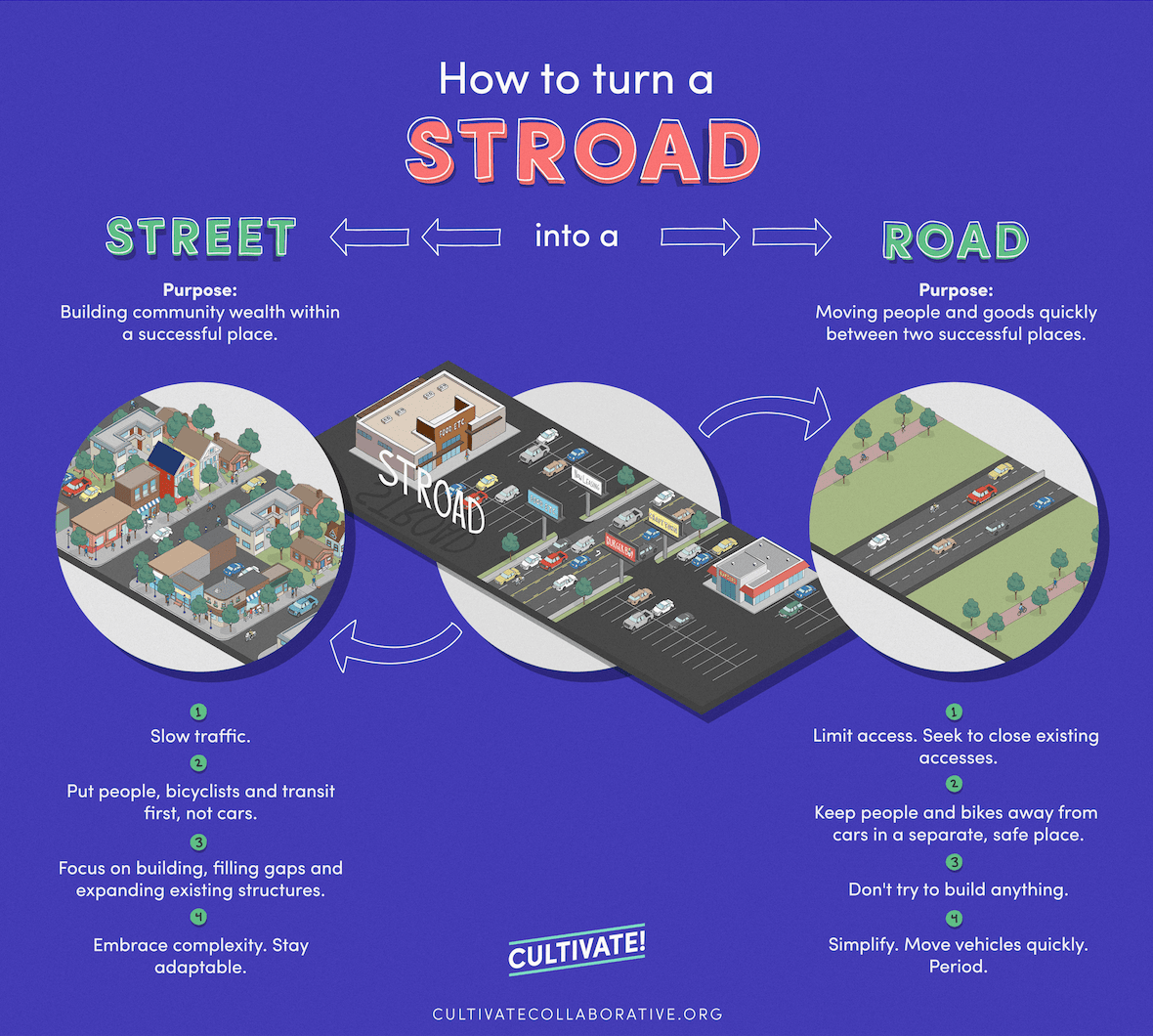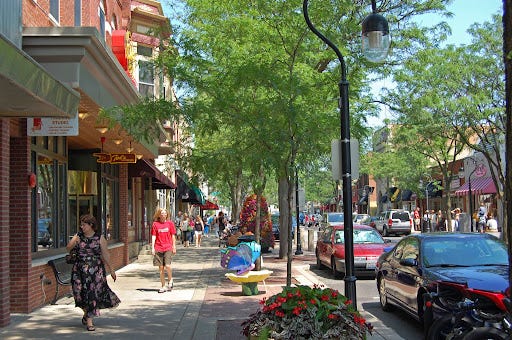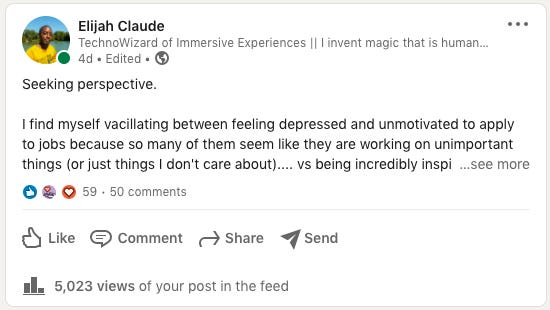The Dire Problem With Our Communities
How car-centric suburbia and paternalism is destroying our society.
tldr: Cities should be designed around people, not cars. Don’t be paternalistic, just empower people to do what’s best for their community.
—
Welcome to my second newsletter documenting my journey to change the world and other arcane arts! This past week, I’ve been on a bit of an emotional roller coaster.
A solid half of that coaster was my stumbling into learning about the problems with car-dependent urban planning. I always knew this was a problem, but actually seeing all of these examples and data hurt my heart. I became so frustrated and yet inspired by what I learned that I decided to dedicate this entire newsletter to that topic.
I will start with nonprofits then go into urban planning, as there is a connection here, but I wasn’t quite able to communicate that connection satisfiably. Hopefully you can also get a feeling for that connection. Oh… and excuse my language, I got a bit passionate with this one. 😅
Without further ado…
What I’m learning:
Nonprofit funding
I met up with one of my old instructors/advisors from Year Up. He has been running his own small-scale nonprofit called East Atlanta Kids Club these past few years. He gave my partner some great insights into how she can maneuver through the nonprofit org she is working with now.
Talking with him showed me once again the sad state of affairs for local organizations and nonprofits. He mentioned a number of problems that struck me as terribly … unnecessary… as in there is no reason why it has to be so difficult and convoluted. Many people who work in nonprofits already deal with a lot… hearing about the added stress of fundraising on top of their service work filled me with so much disgust for the system.
This contextualized my research for Flatiron’s final project last year, where I spoke with a number of people in the nonprofit space, as they also mentioned quite a few of these same problems he mentioned.
Some of those problems I heard are as follows:
Funding requirements (jumping through hoops) - many organizations, individuals, and businesses require nonprofits to satisfy a number of requirements before they actually give the nonprofit money. At first, I thought this was a good thing, afterall, how do you know if your money is being used responsibly or effectively?
But then as they talked more I realized the problem with that: its paternalistic.
Oftentimes, the people requiring nonprofits to do x, y, and z are themselves not actually experts in the field or don’t understand what the nonprofit does.
For instance, requiring a nonprofit to show metrics of progress with child development, not realizing that the nonprofit can’t adequately make progress on child development alone, since they are usually the only point of safety/security for children having any sort of structure in their lives. Unfortunately, much of that development is still up to the parent, but the nonprofit can’t tell the parent what to do, since they can just pull their child out of the program if they feel chastined by the nonprofit. Many small-time nonprofits are trying to secure any kind of beachhead in their communities. They don’t have the time, money, or support for reliable metrics. Therefore requiring them to do so just to secure your contribution, which is just one of *many* that they have to secure is making it harder for them to do their work.Everytime a nonprofit has to 1) figure out who to contact for funding 2) figure out how to contact them 3) follow up with them to ask for their funding requirements 4) figure out how to measure their amorphous/demoralizing efforts at effecting change to qualify for that funding, etc… they are wasting time, money, and effort they could be spending helping their kids or whatever else they are doing.
It's much better to just visit the nonprofit yourself, and if you like what you see or believe in what they’re doing, give them money, no questions asked.
Checks getting lost in the mail - This is such a silly problem… but apparently people still send checks in the mail (and ONLY will allow funds to be sent to a nonprofit via this method). But as the US mail system gets more and more strained by things like voter fraud allegations forcing ballot recounts plus tax filing communications and all manner of things (on top of being underemployed) its more likely for thousands of dollars to just be lost in the mail… Oftentimes, the nonprofit gets blamed for it and deemed ‘unorganized’...
For local nonprofits, this could be the difference between life and death. Figuratively (but possibly literally for the people who depend on them too).
Dealing with government inefficiencies - Similar to above, many nonprofits have to deal with government requirements for grants, or moving at their pace for licensing and permits, etc. I’m sure I don’t have to go into greater detail here.
Partnering with other nonprofits - This is less of a problem and more of a solution. But nonprofits are often better off if they can find and work with other nonprofits who are doing complementary work. Ideally, they could be physically located near each other to make it easier for funders to see such large partnerships in action. Unfortunately, it is difficult for them to secure enough funding to buy large amounts of property for such an endeavor.
Living on the edge - Many nonprofits are like many Americans in that they live paycheck-to-paycheck. If they don’t get the funding they need that year (or even per quarter), they usually will have to dissolve or lay off most of their staff. This of course adds to their being understaffed, underpaid, and overworked. It’s a well known fact that most people get into nonprofit work for the impactful work, not the paycheck… but having to worry about whether or not you’ll be able to operate next year explains a lot as to why so many nonprofits don’t often grow to make a bigger impact over time.
What strikes me with all of this is that though they are no doubt complicated issues, they don’t seem insurmountable. To me, these all seem like problems that can and should be solved with better systems… More in the Big Ideas section.
Urban Planning
I've stumbled across a YouTube channel called Not Just Bikes. It's created by a Canadian who traveled all over the world and chose to move to Amsterdam to raise his kids. He talks in detail about what, why, and how car-centric cities are so shitty. I highly suggest starting with this series where he brings light to the research carried out by the nonprofit group, Strong Towns, who also wrote a book about how to rebuild cities to be more delightful and financially sustainable.
Here are the main things I've taken away from it:
Stroads - This is the rightful name given to the ghastly hybrid between roads and streets that many of us in car-centric cities have thought to be the norm. Yes, if you want to be pedantic, a road can be a street, but a street is not necessarily a road. However, as a design specification, I much better prefer the Strong Towns definition.
Roads are designed specifically for cars to quickly get from point A to point B. Thus, they have a number of safety and quality-of-life features to accomplish that end. This includes: wider lanes, wider curves, fewer turning lanes, bigger signs, wide clear zones, etc. Thus, cars can maintain high speeds safely for long periods of time.
Streets, on the other hand, are designed specifically for people to move around a neighborhood. The goal here *should be* to facilitate the free movement of pedestrians between buildings. Those buildings can be residential, commercial, etc.
Here is a great video that goes into detail about the problem with stroads.
Here is a nice picture visualizing this as well:
Many of us live in places where they just keep widening stroads at the cost of pedestrian safety and quality of life… And car convenience! It has been shown multiple times that widening roads NEVER eases traffic!! Yet our cities waste billions of dollars on this endeavor.
Furthermore, these stroads are anxiety-inducing for all comers. Pedestrians have to hope there is a reliable sidewalk that won't just end abruptly. Bikers, if they are even thought of, are almost never given safe lanes. Drivers have to watch out for cars coming in and out of all of these turning lanes, plus stop lights, plus stop signs, plus pedestrians all while traveling at high speeds.
So not only are these inefficient, but they are also wasteful and nobody wins.
Stroads are STUPID. And I will, for now on, refer to them as such in my daily life to remind myself and everyone else that it does not and should not have to be this way.
Why suburbs suck in car-dependent cities - Not Just Bikes explains it very well in the Strong Towns series linked above, but in short, suburbs have been sprawled out due to car-centricity. In fact, many places in the US and Canada used to have good, pedestrian-friendly neighborhoods, but they were destroyed and paved over to make way for highways, stroads, big box stores with huge parking lots, and single-family boring ass carburbia.
‘Fun’ fact: Many of those neighborhoods that were destroyed happened to be black and brown communities...
In an ideal suburb (or any neighborhood), you would be able to simply walk to your local convenience store (usually a ‘mom and pop shop’) for your daily needs. This may sound too troublesome for those of us raised in these shitty car-centric neighborhoods… but please realize that when I say ‘walk’ I don’t mean trek through miles of stroads with little/no sidewalks or a bunch of parking lots. I mean actually having a pleasant stroll down a beautiful, lush, pedestrian-friendly street where kids can safely run around, people bike regularly (and leisurely), where the stores are right off the street, and the noise level is low due to very few cars speeding through. If you've been to a historic downtown square, you kinda know what I mean. But unlike much of those squares, it would be the entire neighborhood.
Unfortunately, due to zoning laws, it is literally illegal to build such a neighborhood in many places across car-centric cities. You need to have streets that are wide enough for two cars to pass, you can’t have commercial stores close to residential areas, housing plots have a minimal plot size, there are arbitrary setback rules, and so much other bullshit.
Car-centric suburbs are boring - Once again, because of the zoning/building laws, neighborhoods are basically required to all look the same. For some reason, we have thought it sensible to allow some people to just sit around dictating what is ‘aesthetic’ and what is ‘safe’ despite the quantitative and qualitative data showing otherwise. They dictate how big or small houses can be, if you can share them, your lawn size (which is a waste of greenspace), and more. Due to this top-down approach, almost every single car-centric suburb is monotonous with no sense of culture, safety, or ecological diversity.
Car-centric suburbs are classist - Because cities are built with the assumption that everyone would drive a car, jobs are unnecessarily far away. So you literally need a car just to work. Mass transit is shot down by NIMBYists. And so people who want to get a job, somehow have to first cough up the money to buy and maintain a vehicle. Furthermore, because these suburbs only allow single-family homes, young or less fortunate people have to compete with folks who can afford to buy a large house, rather than simply getting a more cost-efficient multi-family home (duplex, triplex, or small apartment).
Really think about this for a second, if all/most commercial buildings are located miles away, and all you have are unsafe, unwalkable stroads to get there. How would you get a job without a car? Maybe public transit? But of course, mass transit is seen as something only poor people use… thus they almost never get enough funding to expand out. So most people either don’t have access to it, or have to deal with an inefficient and unreliable system. (And no, taxis/ubers won’t work as they are just as expensive nowadays in many cities).
This means that people who do not have living-wage incomes are limited to living in areas that are essentially slums, wastelands where no tax revenue is made to support the infrastructure of the neighborhood. Thereby creating poverty traps.
In car-centric suburbia, you rarely ever see people of vastly different income levels unless its outside of your bubble. Thus, the only real interaction middle income people would have with lower-income people would be in ‘urban’ city centers or walking on the side of the street/stroad, or on mass transit or begging. They don't see the daily humanity of people just trying to make a living but getting the short end of the stick, they just see the miserable state of these ‘poor people’ (and of course crime born from that desperation).
Cities that are car-centric are built upon and exacerbate inequality.
Ideally, you would have a neighborhood where single family homes, multifamily homes (duplexes and triplexes) as well as small/midsize apartments and of course small stores and schools are all in the same area. This would make it so that you literally would not need a car to drive anywhere on a daily basis. Cost of living would be lower since you actually could work a minimum wage job and still afford a home.
Furthermore, you could have diverse neighborhoods where people with different income levels live together, thereby increasing social cohesion.
Car-centric suburbs are not kid-friendly - Once again, because stroads are so dangerous to walk, most parents don't feel safe allowing their kids to walk to school. This means that schools and roads with schools on them get congested daily from the traffic of having to drive kids to/from school. Cities myopically respond by consolidating schools to all be built in centralized locations where you’d just have one large school for a huge residential area… further exacerbating the problem of kids not being able to walk to school. Furthermore, since even neighborhoods are designed for cars first, and pedestrians second, kids rarely ever are allowed to play outside on their own.
Parents are terrified of their kids potentially being hit by a car, kidnapped, etc… so of course they keep them inside or shuttle them to after school activities.
Therefore, kids are not allowed to experience the crucial stage in their maturity where they begin to do things on their own such as walking to the store, school, or the park unsupervised. Such a thought is blasphemy to many people indoctrinated to believe that such a thing is ‘irresponsible’. And of course, because schools themselves are so big, you get less intimate education experiences and schools are treated more like prisons rather than an opportunity to learn and make friends.
Many schools have overcrowded children with underpaid, underappreciated faculty (who themselves can't afford to live close to the school).
It’s no wonder bullying, depression, anxiety, codependence, and antisocial behaviours are at an all time high. We literally have 2-3 generations of shitty child development as the new norm.
The pandemic also showed people how ‘terrible’ it is to have your kids all day with nowhere for them to go… Lemme not get into the realization I found talking to teachers and daycare workers who told me how many parents kick up a huge fuss about not being able to leave their kids there...
Car-centric suburbs are financially unsustainable - Here’s what really threw me over the edge. Turns out that these car-centric, single family home suburbs with big beautiful lawns and 2 car garages and endless cul-de-sacs and so on… are insolvent. They are fundamentally not able to cover their own expenses and thus run on debt. Turns out when you have less density and diversity in an area, you also have less tax revenue, whaddya know… 😒
These suburbs can’t even afford to maintain their own ugly-ass stroads, thus why we have so many potholes and other infrastructure problems that never get fixed.
Having no local businesses + replacing a strip of mom-and-pop shops with a chain restaurant or big box store that needs a parking lot bigger than the store itself means you have less tax revenue coming in from commercial estates too.
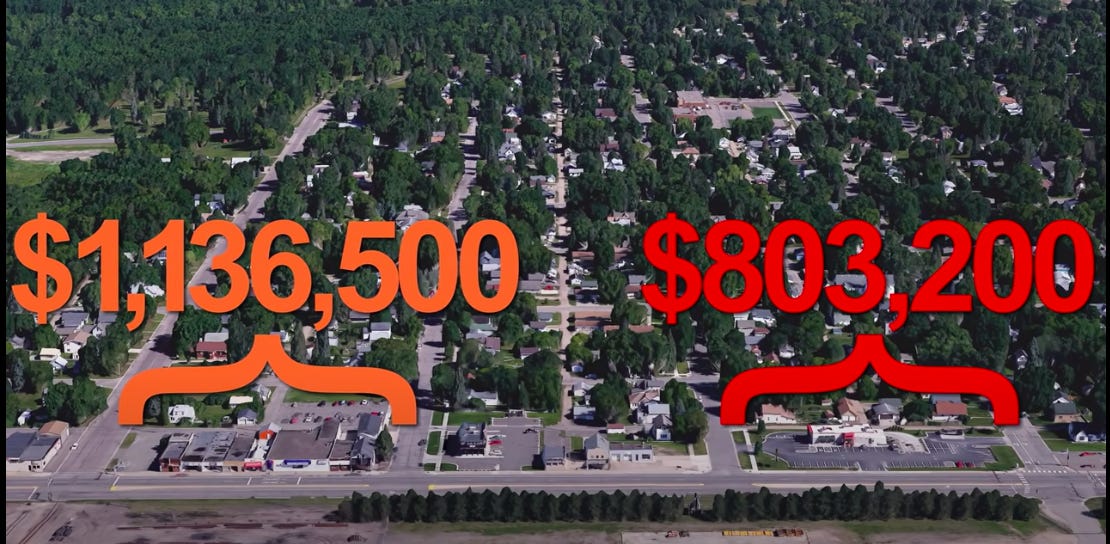
Again, Not Just Bikes goes into further detail… But the point is that these suburbs that so many people have been raised to believe is the ‘American Dream’ are all around a huge fucking waste. They are inefficient, dangerous, monotonous, tools of inequity, they destroy communities, and dare I say… they are unAmerican.
What freedom do you really have if you are basically *required* to have a car to partake in the economy? What freedom do you really have if you are limited to living in a home someone else prepackaged for you like an enclosure in a zoo with inhumane (and incompetent) eco habitats? What freedom do we really have in America and any other place that cares more about the freedom of cars rather than the freedom of the humans driving them?
We thought cars would mean freedom. We have made a mistake. I just hope it's not a fatal accident. (And by we I mean our parents/grandparents who were bought and sold by this dream. I always hated cars and am thrilled to now have the data to show why they are so terrible)
It seems we let the cars drive us around while we fell asleep at the wheel. Wake up from your dream and look at this massive pileup that it caused.
Big Ideas (What I’m thinking):
Terrible puns aside, learning about the sheer idiocy and failure of our urban planning has led me to a new level of frustration and motivation for radical change. So here are some ideas I am thinking about to solve these problems:
Make America Walkable Again
Obviously this applies to anywhere in the world that is car-centric, but I couldn’t pass up the opportunity for a bad joke. :D
But seriously, I think we need a concerted effort to (re)build our cities to be walkable once more. By doing so, we will, if not solve, at least make a meaningful difference in the fight against poverty, inequality, youth liberation, loneliness, and even racism. By (re)creating mixed-use neighborhoods we will foster diverse communities where people are exposed to people of differing backgrounds more regularly. Furthermore, we will be able to once again support local businesses, which are the backbones of our communities.
This starts with removing the zoning laws and other limitations in your city that restrict the building of mixed-use neighborhoods (ie Strong Towns). This will allow more affordable housing (thats not justy shitty government/big business projects), more tax revenue in your community, more intimate schools, more public spaces (such as libraries and parks), and so on.
This will not be trivial. Yes, we have the blueprints for how to build these cities, but it will be difficult to figure out how to transition away from 60+ years of carburbia. This will require a lot of thinking, planning, and foresight. It must be done on a case-by-case basis in order to bring the most of the local community and allow every community to have their own cultural aesthetic determined by the people who live there.
I see this as a perfect opportunity to use 21st century tools such as big data, simulations, and communication channels to figure this out.
This may be a bit of left-field leap in logic, but I see this intimately connected to the problem of so many corporate jobs being fairly meaningless or at least over-focused on production. As well as with nonprofits being largely inefficient due to having to deal with antiquated systems.
Hyperlocal Tech Organizations
I’m going to go on a tangent, but I promise it's all related. This week I posted on LinkedIn how frustrated I felt with the job market. This feeling is constant for me, as I always feel like companies should be doing actually meaningful stuff rather than just claiming they’re changing the world while really just marketing another useless product.
That post was my most popular post ever. It got thousands of views and several dozen comments from people who also feel the same way. They gave me all sorts of great perspectives on how to deal with this feeling.
But what struck me the most was how many of them also felt the same… how many of them knew that their jobs (or jobs they had in the past) are meaningless. Many of them simply learned to deal with it, or find meaning in the small wins or via side projects.
That feels wrong to me. Again, maybe its just my naivete or my narcissism speaking… but I feel like we all should work on things that truly matter. That actually make a positive difference in people's quality of life.
So… as I was learning and talking about this problem of urban planning in my audiojournal, it hit me.
Why not have jobs where designers, engineers, marketers, etc worked at local organizations to improve their local community?
This is a time-tested solution that enables incredibly strong communities that only changed during the industrial age through to the end of WWII.
People used to work as local cobblers, smiths, textile workers, etc for centuries. So why not bring that back? But instead, we can have the digital equivalent.
You may not understand how this is possible if you are unfamiliar with the metaverse and the role that software plays in the world today, but it has been talked about for over a decade now about how software is eating the world. How everything that can be computed, will be. And as the metaverse begins being built out more, our physical world will interface more and more with the digital, the virtual, in more tactile ways. Meaning there will be digital twins of your neighbors and their houses in virtual worlds. You will be able to buy something in a virtual world and 3D print into meatspace. You will be able to talk with somebody across the world via a hologram. You will be able to keep virtual pets or have robot companions who interact with the physical world through IoT (internet of things) smart devices and so on. The possibilities are endless.
But of course, much of this is already at risk of being privatized.. Being facilitated by big tech orgs such as Facebook, Amazon, Microsoft, Apple, and Tencent/Epic who will control your data… and thus your life. Whereas before it was urban planners who thought everyone should have a car determining how your neighborhood was built, and thus destroying your community… It will now be big tech who figures everyone should have an Oculus headset or an Apple account or whatever their money-making product is determining how your cities will be built.
I refuse to live in that world. I absolutely will not stand for this opportunity for radical change to be co-opted once again by people who want to impart their vision for the future on everyone else. We need to stop allowing these colonisers to assert their dreams on us.
Therefore, I think we should do our best to start, foster, and support local organizations that build tools for their local communities to develop their own communities.
Imagine for a second being able to work as a designer, engineer, marketer, etc who gets to build out the software your kids will use at school, or the autonomous garbage trucks that eliminate the need for garbage day, or the virtual storefront that your grandparents can use to maintain their physical shop remotely… Imagine actually being able to see the impact your work has on the people that live right next to you. Imagine how much easier it would be to show your kids what you do and how you do it by taking them to your office right down the street, or letting them design your virtual office with their toy brick set…
Because the cost of living will go down in these walkable communities, the living wages wouldn’t need to be so high. Subsequently, you can actually have local tech companies or nonprofits rather than big ones being the only folks who can afford to pay well.
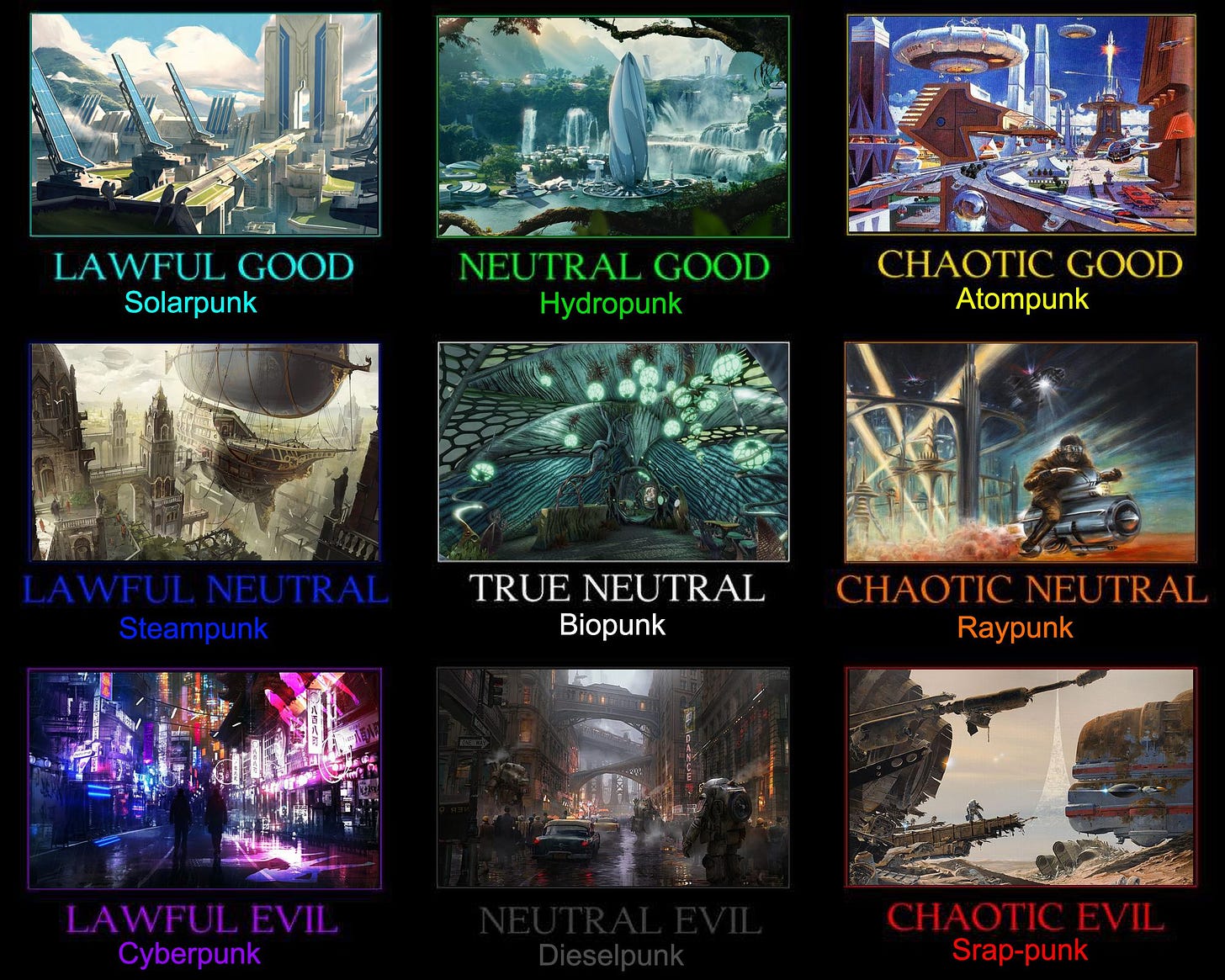
Idk if this world is something other people can see as clearly as I do… but I yearn for the day when we can have communities that are formed from the bottom up instead of top-down.
Unlike the communities of the past, we now also have the internet and more transit options that can make it easier to keep these communities diverse and informed.
Tech is not neutral. It naturally empowers the people who get to decide how (and for who) it is used, built, sold, and marketed (usually the cost of everyone else). Let’s take matters back into our own hands. Let’s ensure the current and future technologies are hyper localized to actually meet the unique needs of people through their own communities. Let’s stop allowing people to colonize local communities with some ethnocentric vision for the future and instead allow each community to envision and create their own futures.
Nonprofit Community Centers
I wonder if I could put together a team to really try and tackle these community problems now. I know I still don't have enough skills to lead this myself… but I certainly would love to be a part of it.
What if we start creating virtual (and eventually physical) communities where you can see all the local nonprofits in your area? You can easily learn what they do, visit them, talk to the people there, and give them money as effortlessly as you would buy something from Amazon.
Yes, there’s bigger money at play, but that doesn’t mean it should be hard to give or receive money. Especially if you actually see what they’re doing, and have multiple ways to account for their impact in the community besides making them take away time for their work to jump through your hoops.
This could start as a typical 2D site that is like a geotagged directory. Eventually, it could become its own virtual world, where you can visit their physical site virtually to see for yourself, volunteer remotely from anywhere in the world, and make it effortless to support.
As the community grows, it could buy enough physical property to have a center in meatspace where multiple nonprofits can all share a campus or at least a neighborhood. This will allow nonprofits to work together to ensure their charges have multiple touchpoints and also help funders feel better about their contribution making a bigger impact (and it's a great form of social accountability).
Furthermore, if people are really concerned about how their money is being used, we could use talented people to develop blockchain-based funding portals, where any funder can distribute their money, and nonprofits can get money, which would be automatically tracked, released, and re-upped via smart contracts.
Developmental Issues
This is something I want to learn more about in the coming week, but I wonder, what are the measurable developmental issues that may have happened to people raised in carburbia? How have these unwalkable cities impacted the mental maturity and health those of who grew up here?
Is this related to the higher levels of depression and loneliness? Does this have an impact on diversity and being open to experiences? What about risk taking? Is our very sense of community diminished by car-dependency?
I have some ideas on all of that… but I want to do a bit of research before really sharing that as of yet. I hope you will too! Let’s see if we come to similar conclusions next week. :D
—
I have a bunch of other stuff I wanted to talk about… but I couldn’t (didn’t want to) stop myself from going into detail about these community-oriented topics. Expect another newsletter in the coming days where I share yet more things I’ve been thinking and learning about such as the role of IQ, the reality of power structures, more stuff about design, and how we might be able to build more empathetic/humane technologies.
Always Be Plugging:
Thoughts of a TechnoWizard - Check out my (almost) daily audiojournal if you want to hear my unrefined, raw ‘train(wreck) of thought’
A More Delightful Future - Listen to interviews with incredible people designing emergent technologies.
Becoming a TechnoWizard - Watch me learn about all manner of things on my quest to build a better, more magical world on my YouTube.
Path of a Trillionaire/TechnoWizard - Feel free to support me on Patreon! If you think this is a lot, watch what I do when I have some actual money in my pockets!!
The Journal of TechnoWizardry - If you like this newsletter, please share!!



